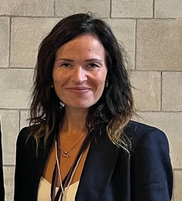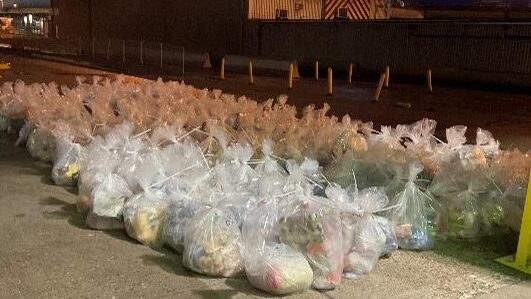The Dover Port Health Authority (DPHA) has warned that cuts to its resources could leave it unable to carry out any checks on illegal meat imports, with a potentially catastrophic impact for the pig sector.
Accompanying last week’s announcement on tightening up the rules governing personal imports of pork products to bolster the UK’s defences against African swine fever (ASF), Defra said it was providing £3.1 million to DPHA for 2024/25 for it help Border Force tackle illegal meat imports.
DPHA, backed by the UK farming and meat sectors, has been calling for increased resource for checks on illegal meat imports since the end of last year, when the scale of the organised crime involved became clearer, and as DPHA’s remit was extended to checks at Coquelles, in France.
The previous government cut DPHA’s resource, however, arguing that it had only ever been temporary until the Border Target Operating Model (BTOM) for commercial imports checks was up and running in April.

Lucy Manzano, DPHA’s head of port health, said the latest funding arrangments would leave the authority struggling to carry out the checks required for illegal meat imports.
“Our response is one of shock. The funding offered for 2024/25 is a cut to our resources, which will eventually see ASF checks reduced to zero at Dover, leaving the UK’s most important border open to catastrophic disease incursion into the country. We are urging the Government to provide this critical funding now and for 2025/26,” she said.
DPHA has seized around 100 tonnes of illegal pork products since the ASF checks were introduced in September 2022, widely considered to be just the tip of the iceberg. Ms Manzano stressed that these checks are completed by DPHA, not Border Force, and accused the government of ‘actively reducing the protections in place for UK supply chains and farmers’ by cutting the funding.
She described government claims that commercial imports are being checked at the border as ‘fundamentally misleading’, as goods are routinely ‘pre-cleared’ online to avoid going for checks 22-miles inland to Sevington and, therefore, avoid queues, echoing concerns recently raised in a letter to Defra secretary Steve Reed by a coalition of meat industry and farming bodies.
“This has effectively created an illegal meat gateway into the UK via Dover – with hundreds of tonnes of illegal meat coming into the country using the commercial route every month as a result,” she said.
Personal checks
Defra announced that from September 27, personal imports of pork and pork products from the EEA (European Economic Area), the Faroe Islands, Greenland and Switzerland are banned, unless they manufactured and packaged to EU commercial standards and weigh less than 2kg.
This removes the previous 2kg limit for pork products that have not been produced to EU commercial standards, while also adding a 2kg limit for products that have (which was not there before). People found to bring pork products in illegally may be fined up to £5,000 in England.
Biosecurity Minister Baroness Hayman said the new measures would ‘protect British pig farmers, preventing infected meat from being brought over the border and threatening our biosecurity’.
Industry reaction
NPA chief executive Lizzie Wilson described the changes as a ‘step forward’, but said they did not go far enough. She said the NPA had been calling for a total ban on personal imports and the rules, which still permit some personal imports, could be confusing for travellers and ‘very difficult to enforce’.
She added: “We also have to stress that these changes do not address the real issue of concern, which is the vast quantities of illegally imported pork entering the country in vans and other vehicles by via organised criminals.
“The previous government slashed funding for the work of the Dover Port Health Authority in carrying out these ASF checks and we continue to call on the current government to provide sufficient resource for this work.”
British Meat Processors Association chief executive Nick Allen said the measures were an improvement, but echoed the NPA’s concerns about the lack of clarity still over what the new measures mean and how they will be enforced. “It would have been much simpler just to ban all personal imports,” he said.
He also reiterated the need to properly fund checks for illegal meat imports at key ports like Dover. “It is this organised illegal trade that poses by far the biggest threat to the British pig sector and that is where the focus still needs to be,” he said.
NFU President Tom Bradshaw said the new measures were ‘welcome’, but that there were
still issues which urgently need addressing. “This includes having effective controls in place through the Border Target Operating Model, the necessary resources at the border to tackle illegal activity, and a stricter approach on personal imports of products of animal origin,” he said.
NFU Scotland’s Pigs Committee chair Jamie Wyllie said: “These new measures are one step towards protecting the nation’s pig farmers from a disease that has the potential to wipeout the sector.
“On proper Border controls, we are acutely aware that adequate Government funding and resources are an issue, so we are looking to the UK government to provide the guidance and enforcement necessary to back up this change.
“As an example, Scottish Government has provided detector dogs for use at Scottish ports of entry, following requests for support from the sector to help protect our Borders.
“However, the worrying reality is that current checks across the UK are only revealing the tip of the iceberg where illegal meat imports are concerned, and this welcome change must be properly resourced.”




